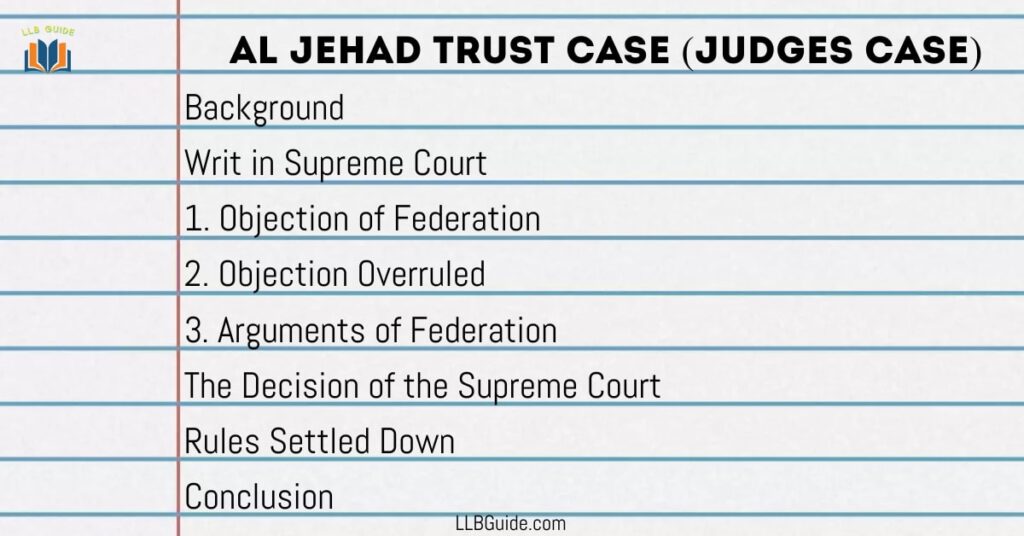The leading case, Al Jehad Trust case Vs. the Federation of Pakistan is also known as Judges Case. In this case, the Supreme Court of Pakistan settled down the rules regarding the appointment of ad-hoc judges, acting judges, permanent judges, and their transfers, etc, and blocked the interference of the executive in the judiciary.

Al Jehad Trust Case (Judges Case) PLD 1996 SC 324
Al Jehad Trust Case concerns articles 177 and 193 of the Constitution of Pakistan 1973.
Article 177 describes ‘the President is required to consult the Chief Justice of Pakistan, to appoint the judges of the Supreme Court’.
Article 193 states ‘the judges of the High Court are to be appointed by the President but after a consultation with the Governor, Chief Justice of concerning High Court and the Chief Justice of Pakistan’.
Facts of the al jehad trust case 1996 and the Al jehad trust case summary have been described below.
Background
In Lahore High Court a permanent vacancy becomes vacant. The Chief Justice consulted a name to the President to fill such a vacant vacancy but the President rejected that name. The President also appointed another person of his choice for such a vacancy.
Writ in Supreme Court
A practicing lawyer who headed Al Jehad Trust filed a writ petition in the Supreme Court of Pakistan under Article 184 (3) of the 1973 Constitution.
The petitioner challenged the appointment of certain judges of the Lahore High Court including the Acting Chief Justice. The petitioner alleged that they were appointed to their posts by the President for political reasons and in an unconstitutional manner.
Objection of Federation
The Federation of Pakistan raised an objection to this writ petition saying that it did not concern any fundamental rights so not maintainable under Article 184 (3).
Objection Overruled
The Supreme Court of Pakistan overruled the objection on the fact that the petitioner was a practicing lawyer and under Article 18 of the constitution everyone has a right to earn a livelihood through his profession and independence of the judiciary is directly related to the livelihood of the lawyers.
Arguments of Federation
The Federation of Pakistan mainly argued on the following points:
- That it was the executive power of the President provided by the Constitution.
- The President is only required to consult the Chief Justices but not required to obtain his consent.
- That the judges automatically become transparent and independent after taking oath.
The Decision of the Supreme Court
Chief Justice Mr. Sajjad Ali Shah and other judges passed the judgment of the Al Jehad Trust case (Judges case) in favor of the petitioner.
The Supreme Court provided a wide interpretation of the word “consultation” used in Articles 177 and 193 of the Constitution. The consultation process between the President (layman) and the Chief Justices (the judiciary) must be:
- Meaningful
- Purposive
- Transparent
The President should accept any particular name proposed by the Chief Justices unless the President has sound reasons given in writing for rejection.
Though the order of the appointment of the judges was made in the name of the President, this did not mean that he could exercise this power in a random manner (arbitrarily).
Rules Settled Down
The Supreme Court also established many rules regarding permanent judges, ad-hoc judges, acting judges, their appointment and transfers, etc, in the High Courts and the Supreme Court of Pakistan, which are mentioned below:
1. Permanent Judges
If a permanent seat of Chief Justices or other Judges, becomes vacant at the prescribed time, it should be filed within the next 30 days. If a permanent seat becomes vacant due to the death of the judge or his early retirement, it should be filed within the next 90 days.
2. Acting Judges
Acting Chief Justices of the Supreme Court and the High Courts shall not participate in the appointments of judges or making policies,
A judge of the Supreme Court cannot be appointed as the Acting chief justice of the High Court.
3. Ad-Hoc Judges
Ad-hoc judges mean temporary judges. Ad-Hoc Judges can be appointed in the High Courts and the Supreme Court if needed.
- Senior judges of the High Court who are eligible to become Supreme Court judges can be appointed to the Supreme Court as ad-hoc judges,
- Any retired judge of the Supreme Court can be appointed to the Supreme Court if he has not exceeded the retirement period of 3 years,
- Any retired judge of the High Court can be appointed to the Supreme Court if he is under 65 years old.
- The Chief Justice of Pakistan may with the approval of the President increase the number of Ad-hoc judges in the Supreme Court, if necessary.
About the transfers of judges, the Supreme Court said in the judgment of the Al Jehad Trust case (Judges case) that:
- A permanent Chief Justice cannot be transferred,
- If a judge of the High Court is to be transferred to another High Court, the President shall consult the Chief Justice of Pakistan and the Chief Justices concerning High Courts, consultation is not required if the period of transfer is less than two years,
- And a judge of the High Court should not be transferred to punish him.
Conclusion
The judgment of the Al Jehad Trust case vs. the Federation of Pakistan (judges case) lays down the importance of the independence of the judiciary in Pakistani constitutional law.
#Jehad #Trust #Case #Judges #Case







